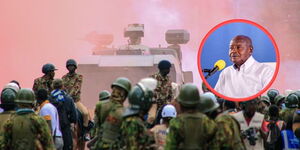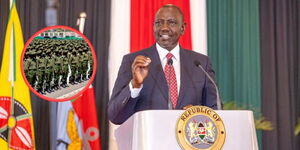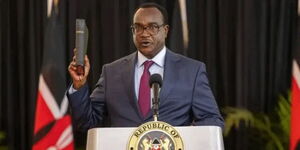Kenyans, on Wednesday, March 18, were caught by surprise as a message made rounds on WhatsApp, stating that a total lockdown was to be announced.
The message detailed how the millitary would be deployed in full protective gear to examine the populace in homes, (Not to test, but examine individuals), and that anyone with a fever would be taken away and quarantined at Kasarani, Nyayo and City stadiums. It also called upon Kenyans to grab loans as taxes, loans repayment, power supply payment, and water payment would be suspended.
WhatsApp, owned by Facebook, having witnessed an outcry over the rate fake news was being spread through the social media platform, announced that it had taken steps to curb misinformation.
It revealed that it had liaised with fact-checking groups and users can forward messages to special accounts that can verify the information.
"There are over a dozen [local fact checkers] so far, and we want more to be able to do their important work so rumours are identified and countered,” Will Cathcart, the head of WhatsApp tweeted on Wednesday, March 18.
The agency also stated that it was promoting the fact-checking organizations and health ministries on Facebook, with free and special clickable ads that pull up a new WhatsApp chat with the corresponding organization.
However, one challenge faced by WhatsApp in its bid to fact check news is the end to end encryption. This makes it harder for officials to track the spread of Coronavirus misinformation.
"The end to end encryption only allows officials to see the sender and receivers of the messages. But the new measures by WhatsApp enable one to find out the authenticity of a message.
You can send it to fact-checkers most who have WhatsApp business numbers and the organisations can respond. WhatsApp is giving fact-checkers the platform to check information," Pesa Check Managing Editor, Eric Mugendi informed Kenyans.co.ke on Thursday, March 19.
A report by CNN on Thursday, March 19, detailed that Cristina Tardáguila, associate director of the International Fact-Checking Network (IFCN), suggested that WhatsApp could include a message asking people “are you sure this is true?” before they send a message related to Coronavirus.
However, Carl Woog, a WhatsApp spokesperson, told CNN Business that it’s not something the platform would be able to do because WhatsApp is encrypted, and that “passing remote judgment on deciding what can be sent and not be sent in a real-time message would be unprecedented” for a text or SMS service.
In Kenya, Health CS Mutahi Kagwe, on Friday, March 13, warned Kenyans against sharing and posting fake news as Government Spokesperson Col. Rtd Cyrus Oguna on Saturday. March 14, informed Kenyans.co.ke that they had initiated a process to track down individuals spreading fake news.
"I would like to caution anyone who forwards and shares fake and false messages. Remember that if you are caught, you will be jailed or would face a fine," Health CS Mutahi Kagwe stated on Friday, March 13, after confirming Kenya's first Coronavirus patient. Kenya so far has confirmed seven Coronavirus cases.
The Directorate of Criminal Investigations (DCI) on Sunday, March 15 arrested a man for publishing misleading information on the Coronavirus (COVID-19) outbreak in Kenya.
Elijah Muthui Kitonyo, 23, was arrested for publishing a viral tweet that purported to expose the first confirmed Coronavirus patient in the country.












